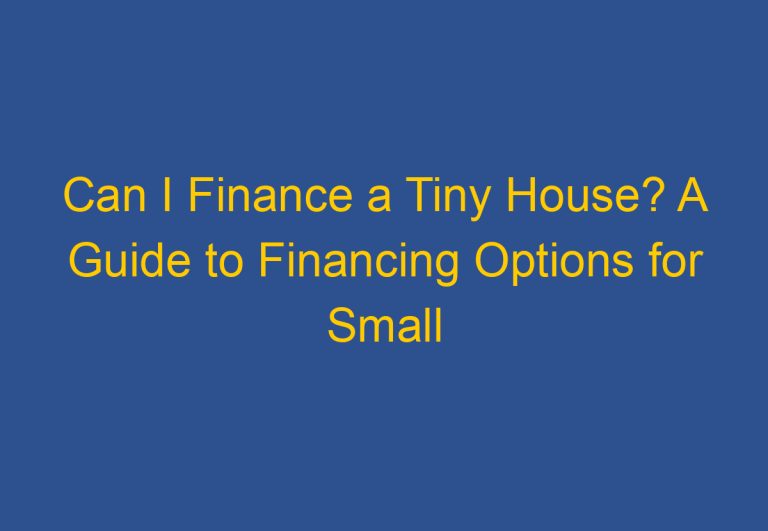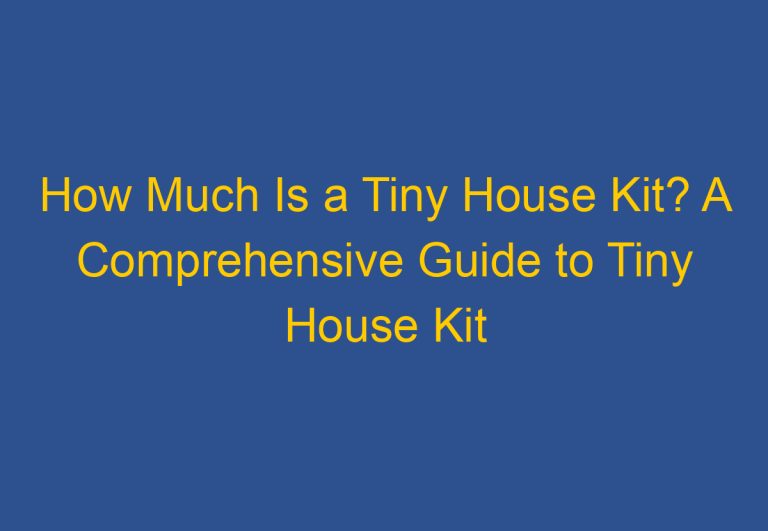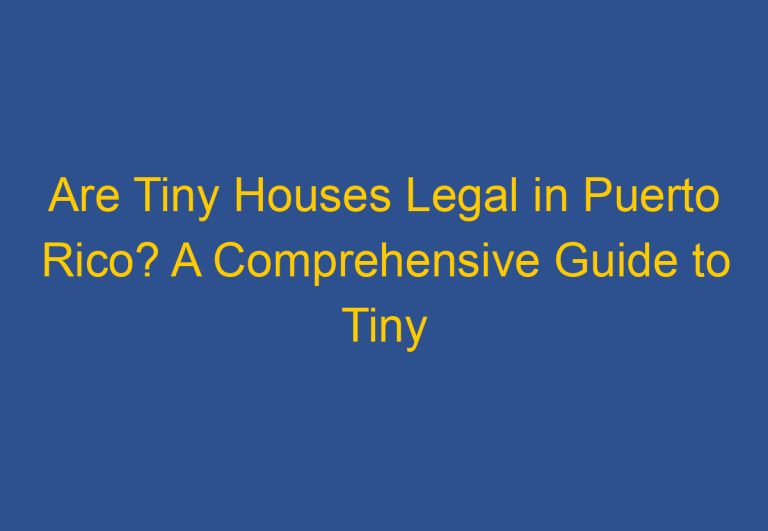Are Tiny Houses Legal in Massachusetts? A Comprehensive Guide to Tiny House Laws and Regulations in the State
Tiny houses have become a popular housing option for people who want to live a minimalist lifestyle or reduce their carbon footprint. However, many people wonder whether tiny houses are legal in Massachusetts. The answer is yes, but there are certain rules and regulations that need to be followed.
In January 2020, Massachusetts legalized tiny houses after adopting Appendix Q, which outlines the safety and building standards for tiny houses on foundations. However, it’s important to note that the appendix doesn’t mean you can build a tiny house on a foundation wherever you want in Massachusetts. You still have to adhere to your municipality’s zoning code, and not all counties in Massachusetts allow tiny houses.
If you’re thinking about building a tiny house in Massachusetts, it’s important to do your research and make sure you’re following all the rules and regulations. This includes working with a licensed tiny house contractor, obtaining the necessary permits, and ensuring your home meets all construction regulations. With the right planning and preparation, you can enjoy the benefits of living in a tiny house in Massachusetts.
Legality and Zoning Regulations
When it comes to tiny houses in Massachusetts, there are several zoning laws and regulations that one must be aware of. This section will delve into the various zoning laws and regulations that govern tiny houses in Massachusetts.
Understanding Massachusetts Zoning Laws
In Massachusetts, zoning laws vary by municipality. Some cities and towns have specific zoning laws and building codes that may restrict or permit the construction of tiny houses. Therefore, it is essential to research and understand the zoning laws in your municipality before constructing a tiny house.
Appendix Q and Building Codes
Appendix Q of the International Residential Code (IRC) provides building safety standards for houses on foundations that are 400 square feet and under. This appendix was adopted in Massachusetts in January 2020, legalizing tiny houses on foundations. However, it is crucial to note that the adoption of Appendix Q does not mean that one can build a tiny house on a foundation wherever they want in Massachusetts. One still has to adhere to their municipality’s zoning code.
Local Ordinances and Tiny House Communities
In addition to zoning laws, there are also local ordinances that govern the construction and placement of tiny houses. Some municipalities in Massachusetts have specific regulations for tiny houses on wheels regarding where they can be parked or stored. Additionally, there are tiny house communities in Massachusetts that have their own regulations and guidelines.
Overall, while tiny houses are legal in Massachusetts, it is essential to research and understand the zoning laws and regulations in your municipality before constructing a tiny house. It is also crucial to adhere to building codes and permits for safe and legal tiny house construction.
Building and Living in a Tiny House
Living in a tiny house has become increasingly popular in recent years, offering a unique and affordable housing option. However, building and living in a tiny house in Massachusetts requires navigating various regulations and codes. This section will explore the construction standards, property considerations, and financial aspects of building and living in a tiny house in Massachusetts.
Construction Standards and Safety
When building a tiny house in Massachusetts, it is important to adhere to the state’s building codes and safety regulations. The ceiling height of the habitable space and hallways must not be less than 6 feet 8 inches, and the ceiling in bathrooms, kitchens, rooms, and toilets in a tiny house must have a height of not less than 6 feet 4 inches. Additionally, the house must have a minimum square footage of 400 sq. ft. and comply with Appendix Q: Tiny Houses, which provides building safety standards for houses on foundations that are 400 sq. ft. and under.
Accessory Dwelling Units and Property Considerations
Before building a tiny house, it is important to consider property and zoning regulations. Massachusetts allows accessory dwelling units (ADUs) in some counties, each with its own regulations and building codes. It is also important to consider parking regulations, as many municipalities require a permanent parking space for each dwelling unit.
Insurance, Taxes, and Financial Aspects
Building and living in a tiny house can have financial benefits, but it is important to consider insurance and tax implications. Many insurance companies offer policies specifically for tiny homes, and property taxes may be lower for a smaller dwelling. It is also important to consider the cost of utilities, maintenance, and any potential homeowners association fees.
Overall, building and living in a tiny house in Massachusetts requires careful planning and consideration of regulations and codes. However, with the right resources and knowledge, it can be a unique and affordable housing option in a competitive housing market.
Frequently Asked Questions
What zoning regulations affect tiny house placement in Massachusetts?
Zoning laws in Massachusetts can impact the placement and size of tiny houses. Each town or city may have its own zoning regulations, so it’s important to check with your local government before placing a tiny house on a property. Some areas may require a minimum square footage for a dwelling or have restrictions on the placement of tiny houses on wheels. It’s essential to adhere to these regulations to avoid legal issues.
Can I legally build a tiny house on my property in Massachusetts?
Yes, it is legal to build a tiny house on a property in Massachusetts, but there are specific regulations and requirements that must be met to legally reside in one. The tiny house must comply with local zoning regulations, building codes, and safety standards. It’s important to obtain the necessary permits and approvals before beginning construction.
Which Massachusetts towns have embraced tiny house living?
Nantucket County is one area that has embraced tiny house living. The county’s zoning bylaw permits tiny houses on wheels that are under 500 square feet and constructed on a movable trailer to be attached to a foundation. Other areas may have different regulations, so it’s important to research the zoning laws in your desired location.
What are the building code requirements for tiny houses in Massachusetts?
Tiny houses in Massachusetts must adhere to the state’s building code requirements for one- and two-family dwellings. These requirements include minimum ceiling heights, stairway dimensions, and egress requirements. It’s important to work with a licensed contractor who is familiar with these regulations to ensure compliance and safety.
How does the cost of constructing a tiny house in Massachusetts compare to traditional homes?
The cost of constructing a tiny house in Massachusetts can vary depending on the size, materials, and features. However, in general, building a tiny house can be more cost-effective than constructing a traditional home. According to The Tiny Life, the average cost to build a tiny house is between $15,000 and $80,000, while the average cost to build a traditional home is over $300,000.
Are there established tiny home communities within Massachusetts where I can reside?
Yes, there are established tiny home communities within Massachusetts where you can reside. One example is the Bantam Cottages in Brewster, which is a tiny house community that offers year-round living. It’s important to research and visit these communities to ensure they meet your needs and lifestyle.










